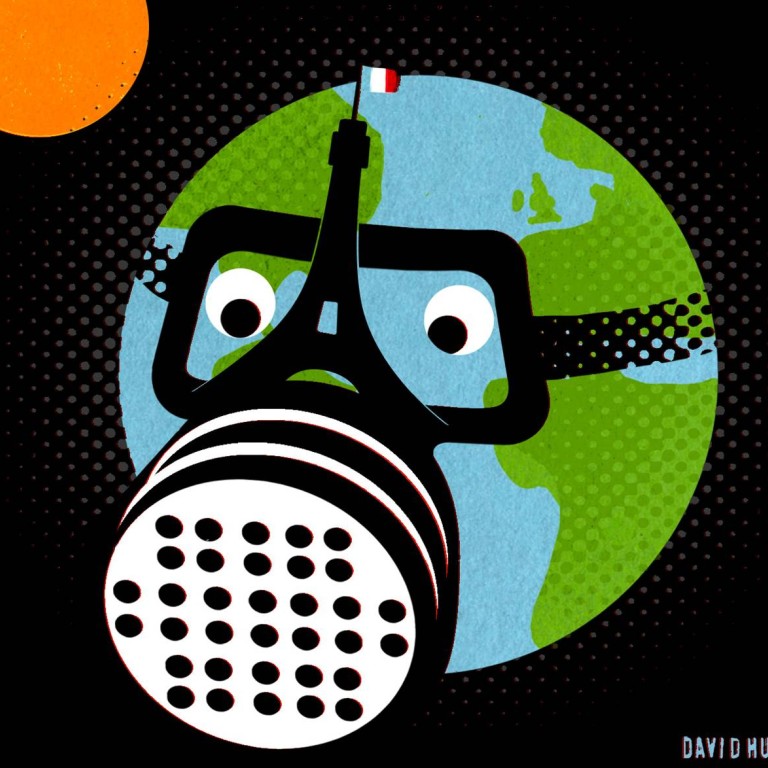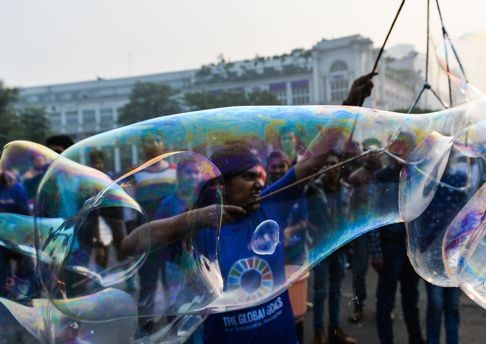
Paris climate summit: Any deal reached on carbon emissions simply won’t be good enough
Kevin Rafferty says despite high expectations, whatever the final outcome of the UN conference, it is unlikely to be sufficient to stop dangerous global warming

READ MORE: Paris climate summit: A world of differences in the way of global pact
The good news is that there is increasing hot air about a global agreement to reduce carbon emissions to try to slow global warming. The bad news is that any deal will not be enough.
The world is still divided into squabbling, often bitterly nationalistic countries, whose immediate or short-term interests are opposed to any global ideals
It is not merely a question of too little, too late: there are substantial unresolved scientific, economic, political and moral issues at stake, which require a global solution, but the world is still divided into squabbling, often bitterly nationalistic countries, whose immediate or short-term interests are opposed to any global ideals.
This year will be the hottest on record, according to the World Meteorological Organisation, and the world is on course to reach the significant milestone of 1 degree Celsius above the pre-industrial era.
In spite of the gloom, some scientists optimistically believe that “Science Superman” will ride to the rescue in the nick of time. Rapid development of electric cars could transform transport by replacing polluting cars, lorries and buses with clean green energy.

The world’s governments have finally woken up to the dangers and opportunities of climate change. More than 180 of the 196 parties which have gathered in Paris, representing 97.8 per cent of global greenhouse gas emissions, have submitted pledges to reduce their carbon emissions, known as the “intended nationally determined contributions”, or INDCs.
READ MORE: Climate pledges and mass marches dominate lead-up to UN summit in Paris
“Green Planet” has become a buzz phrase. Big Western, Chinese and Japanese companies are salivating at the prospect of US$90 trillion in energy infrastructure business over the next 15 years. Optimists assert that if leaders in Paris signal they are serious about a green earth, business will deliver.
Such is the momentum that Timmons Roberts of the Brookings Institution declared that “2015 has been an unexpectedly positive year for climate change efforts, as the long-floundering UN process has finally begun to deliver some of what is needed”.
Roberts conceded that it’s not enough: “What do the INDCs add up to? Not enough reductions, unfortunately.” The world is still headed to 3.5 degrees Celsius, 3.1 degrees, or 2.7 degrees of warming above pre-industrial levels, “depending on the assumptions one uses in projections”, he said.

The US could and should be named and shamed for acting with no thought for the consequences of its selfishness, especially on poor and vulnerable countries.
READ MORE: A climate for change: how China went from zero to hero in fight against global warming in just 6 years
So should other major polluters. China recently revealed that it was burning 17 per cent more coal than previously disclosed. The increase in carbon dioxide involved is more than Germany’s annual emissions from fossil fuels. It was also unhealthily appropriate that, on the eve of the Paris talks, Beijing issued a warning of high smog levels.
India, third in carbon dioxide emissions with 2.4 billion tonnes (behind China and the US), is on track to be at least the second biggest emitter by 2030 or even the biggest without dramatic measures.
The Paris pledges are in terms of emissions per unit of gross domestic product growth, so a rapidly growing country could meet its pledges and still increase total emissions.

Chinese and Indians would be dicing with disaster for themselves and the planet if they ape wasteful Western ways, even if they don’t go the greedy hog into meat diets, with meat requiring far more resources to produce than vegetables.
Chinese and Indians would be dicing with disaster for themselves and for the planet if they ape wasteful Western ways
Let’s not forget a dishonourable mention for Japan, which pledged 1.3 trillion yen (HK$82 billion) a year to help developing countries fight global warming (and help its own companies to good business). Environment minister Tamayo Marukawa last week declared that coal technology exports “remain a priority” for Japan: surely she understands that clean coal is an oxymoron.
Maverick economist Bjorn Lomborg suggests that all the huffing and puffing in Paris is indeed a lot of hot air. If all the INDC promises are fully met by 2030 and then extended for 70 years, he claims, “the entirety of the Paris promises will reduce global temperatures by just 0.17 degrees Celsius”. Lomborg advocates pouring money into renewable energy, though it is doubtful whether it will yield big enough benefits worldwide before it is too late.

The problem is that greenhouses gases are already swirling in the atmosphere. Temperatures a couple of degrees higher may not seem much, and have led to warped jokes about Greenland as the world’s farming leader and permanent sun tans for the rest of humanity.
Even a 2-degree temperature increase will trigger rising sea levels, engulfing Pacific island countries and invading Bangladesh and cities like Miami, New York, Guangzhou, Shanghai and Mumbai. Deserts will grow and millions of hectares of fertile farmland will disappear.
READ MORE: In global fight to slow climate change, Hong Kong is proving to be a laggard
One basic problem that Paris exemplifies is that we are one earth, and damage to a small corner of the planet comes to haunt us all, but leadership is narrow, national and selfish. Another is that the much revered market solution does not come with any guarantees about caring for our common home.
The biggest problem for the broken leadership of the earth is that the time for action was the day before yesterday, but the way that leaders are talking, they might reach a workable agreement the day after the tomorrow that never comes.
Kevin Rafferty is a journalist and commentator, former professor at Osaka University, and author of a briefing book for delegates at the 2008 UN climate change conference in Poznan

